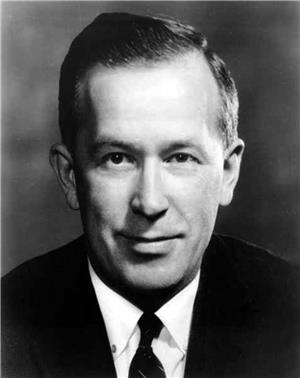On November 3, 1964, Senator Henry M. "Scoop" Jackson (1912-1983) and President Lyndon B. Johnson (1908-1973) win landslide victories, and Democratic challengers defeat four Republican U.S. Representatives. Republican State House Leader Daniel J. Evans (1925-2024) bucks the Democratic tide to defeat two-term governor Albert D. Rosellini (1910-2011).
Jackson, the most successful vote-getter in the state's history, was running for his third term in the Senate. As always, he campaigned hard, but he faced little challenge from Republican Lloyd J. Andrews, who managed only 28 percent (337,138 votes) to Jackson's 72 percent (875,950). President Johnson, on his way to a huge nationwide victory over Barry Goldwater (1909-1998), did almost as well in the state, winning 62 percent (779,881 votes) to Goldwater's 37 percent (470,366).
Long Coattails
With Jackson's own re-election virtually assured, he devoted much of his campaign time and resources to aiding Democratic candidates challenging the Republicans who held six of Washington's seven seats in the House of Representatives. Jackson's campaign assistance, and his and Johnson's coattails, dramatically altered that balance as four Democrats defeated Republican incumbents, giving Democrats five of the seven seats.
Thomas S. Foley (1929-2013) of Spokane, who worked for Jackson on the Interior Committee that Jackson chaired, resigned his position to take on 11-term incumbent Walt Horan (1898-1966). Foley defeated Horan in the heavily Republican Fifth District in Eastern Washington by 53 percent (84,830) to 47 percent (73,884). He went on to hold the seat for 30 years, serving as Speaker of the House from 1989 to 1995, before being defeated by George R. Nethercutt Jr. (b. 1944) in the 1994 Republican landslide. Brock Adams (1927-2004), the U.S. Attorney for the Western District of Washington, won Seattle's Seventh District seat by defeating one-term Representative K. W. "Bill" Stinson (b. 1930) by 55 percent (125,223 votes) to 44 percent (100,119). Adams went on to win re-election six times before resigning to serve as President Jimmy Carter's Secretary of Transportation, and later served one term in the Senate.
Democratic challengers also won in the Second District, where Lloyd Meeds (1927-2005) defeated Representative Jack Westland (1904-1982) to take the House seat that Jackson had held before being elected to the Senate in 1952, and in the Sixth District, where Floyd V. Hicks (1915-1992) defeated Representative Thor C. Tollefson (1901-1982). Meeds, Hicks, Adams, and Foley all credited Jackson's support as a key factor in their victories.
Influential Delegation
In the other three House districts, the incumbents kept their seats. Democrat Julia Butler Hansen (1907-1988) was re-elected in the Third District, defeating Harold L. Anderson. Two Republicans survived. Thomas M. Pelly (1902-1973) defeated Edward Palmason in the First District, and Catherine May (1914-2004) beat Stephen H. Huza in the Fourth. During the 1960s and 1970s the Democratic-majority House delegation worked closely with Jackson and senior Senator Warren G. Magnuson (1905-1989), giving Washington significant clout in Congress and helping to enact landmark legislation.
The 1964 Democratic landslide did not help Governor Albert Rosellini win a third term. He lost with 44 percent (548,692 votes) to 56 percent (697,256) for State Representative Dan Evans, a civil engineer and moderate Republican whose successful campaign promised a new "Blueprint for Progress." Democrats took all the other statewide offices except one: Republican Ludlow "Lud" Kramer (1932-2004), a fellow moderate who campaigned alongside Evans, ousted two-term Secretary of State Vic Meyers (1898-1991), the former bandleader who had also served five terms as lieutenant governor.
Dan Evans went on to serve three consecutive terms as governor, a feat that had eluded Rosellini and all prior governors. Evans won his third term in 1972 by defeating Rosellini in the latter's final attempt at a political comeback. In 1983, following Jackson's death after winning his sixth Senate election, Evans won a special election to serve the remainder of Jackson's term.

